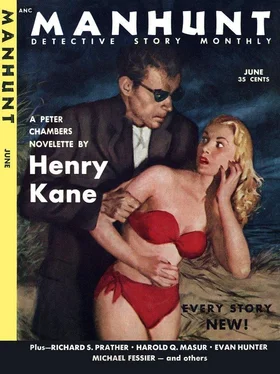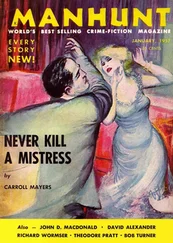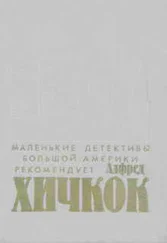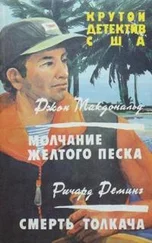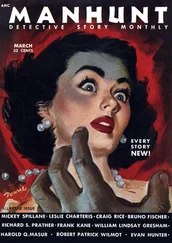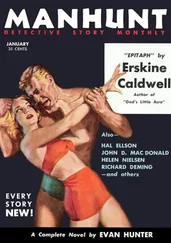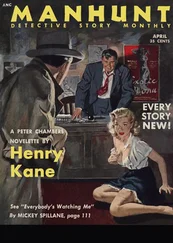Ричард Деминг - Manhunt. Volume 1, Number 6, June, 1953
Здесь есть возможность читать онлайн «Ричард Деминг - Manhunt. Volume 1, Number 6, June, 1953» весь текст электронной книги совершенно бесплатно (целиком полную версию без сокращений). В некоторых случаях можно слушать аудио, скачать через торрент в формате fb2 и присутствует краткое содержание. Город: New York, Год выпуска: 1953, Издательство: Flying Eagle Publications, Жанр: Детектив, на английском языке. Описание произведения, (предисловие) а так же отзывы посетителей доступны на портале библиотеки ЛибКат.
- Название:Manhunt. Volume 1, Number 6, June, 1953
- Автор:
- Издательство:Flying Eagle Publications
- Жанр:
- Год:1953
- Город:New York
- ISBN:нет данных
- Рейтинг книги:5 / 5. Голосов: 1
-
Избранное:Добавить в избранное
- Отзывы:
-
Ваша оценка:
- 100
- 1
- 2
- 3
- 4
- 5
Manhunt. Volume 1, Number 6, June, 1953: краткое содержание, описание и аннотация
Предлагаем к чтению аннотацию, описание, краткое содержание или предисловие (зависит от того, что написал сам автор книги «Manhunt. Volume 1, Number 6, June, 1953»). Если вы не нашли необходимую информацию о книге — напишите в комментариях, мы постараемся отыскать её.
Manhunt. Volume 1, Number 6, June, 1953 — читать онлайн бесплатно полную книгу (весь текст) целиком
Ниже представлен текст книги, разбитый по страницам. Система сохранения места последней прочитанной страницы, позволяет с удобством читать онлайн бесплатно книгу «Manhunt. Volume 1, Number 6, June, 1953», без необходимости каждый раз заново искать на чём Вы остановились. Поставьте закладку, и сможете в любой момент перейти на страницу, на которой закончили чтение.
Интервал:
Закладка:
It was solid enough. I called Homicide and got Samson on the phone. After the helloes I said, “Sam, I’m coming down to get my Caddy in half an hour — boys said it would be ready. You’re buddies with Turner in Scientific Investigation. How about having his infra-red flashlight, and the red-lensed goggles that go with it, in the back of my Cad along with all my junk?”
“What? Why in blue hell do you want that stuff?”
“I, uh, lost something in a dark cellar. I want to go look for it. I’d be awful happy if you didn’t ask me any more.”
“Goddammit, Shell, have you got something we need?”
“Nothing that’s any good to anybody but me. And not a thing that’s worth a damn as evidence — yet. That’s straight, Sam. But go along with me and maybe there will be.”
“I’d like to, Shell, but...”
“And, Sam, you saw the papers. Can’t be helped, but I’d sure like some more stories in them tomorrow or the next day. A story that would rub out the smell before it sinks too far in. And besides, you don’t know what I want the stuff for. Maybe I’m going out to Lover’s Lane and spy on the high-school kids.”
“Shell Scott shot in the head would make a nice story. And what the hell am I going to tell Turner? Well...” He was quiet for a few seconds. “I ought to put you in jail for sending me out to get that crazy woman last night.”
“Was she trouble?”
“When I got to the Grove she was singing. Into the bloody microphone. I like to never got her out of there. And when I did — let me tell you.”
I got my first good laugh of the day from his story. Then he said, “Well, hell, look in your trunk when you get down here. I can’t promise anything.”
“Thanks, Sam. See you.”
There was no trouble getting the Cad, and Sam had left what I wanted in the trunk. The goggles looked much like red-lensed glasses, but the light was a big sonovagun, well over a foot wide and long, perhaps four inches thick, with a curved metal handle on its top. I put them both in the front seat and drove to Eighth Street, parked before Porter’s Radio Shop and went inside. This was my second trip today; I’d been here about noon. Porter, a young studious-looking ex-G.I. came out.
“Hi, Shell. I just finished it up. That’s fifty bucks.”
“A hell of a price for one vacuum tube and a dry-cell battery in a beat-up cigar box.”
He grinned. “You’re paying, my friend, for my genius and brilliant know-how.”
“I’d have made it myself if I’d had the time.”
He sneered, then went into the back room and came out with the “squawk box” I’d ordered. He sat it on the counter beside the compact radio receiver complete with loop antenna. I gave Porter his fifty bucks and he frowned. “You know, I ought to have a deposit on that receiver,” he said. “Only one I got with a loop.”
“I’ll bring it back tomorr—” I stopped. “Maybe I’d better leave a deposit at that.”
I gave him some more money, then used his phone to call Lois again. She answered right away.
“Shell, honey. Well?”
“He... I guess I overestimated myself. He... well, he couldn’t make it. He was awfully apologetic, but he said he’d see me tomorrow instead.”
I laughed. I felt like a million. “Baby,” I said. “He won’t see you tomorrow — or the next day, or the next.”
“Shell, I’ve been just sitting here for almost an hour, thinking a lot. You knew he wouldn’t see me tonight didn’t you?”
“I knew he wouldn’t because if he tried I was going to clobber him with a tire iron. But I did have a hunch he wouldn’t try.”
“Shell! Darn you, can’t you let a girl in on anything?”
“I’ll tell you the truth, Sweetheart. I wasn’t sure I could trust you.”
“You sure now?”
“No. But sure enough.”
“Shell, darn you — damn you!”
“Still friends?”
“Oh, I suppose...” Then her voice dropped lower, softened, got like champagne again, and I remembered her at the dice table in her creme-de-menthe gown, the way she’d looked when I’d asked her what she wore with champagne. She said, “No... I don’t think you and I can be friends.” The “friends” was slightly accented. She went on, “Shell, it seems that every time I talk to you or see you, I learn more about you.”
It seemed time to try pressing my luck again. “How much would you like to learn?”
A soft chuckle was her answer. Then, “Will I see you? Later maybe?”
I thought about that. “With any luck, honey, I’ll see you later.”
“Promise?”
“Sure, honey.”
We hung up. I lugged the squawk box and receiver out to my Cad and sat it on the front seat alongside the flash and goggles I’d got from Sam. I was ready to go.
I drove to Artie Payne’s first. During the afternoon I’d learned where The Professor and the other two lived, and where Professor Payne kept his ’5 °Chrysler — which was used on the trio’s jobs. It was dark when I reached his place, and it took me only a couple minutes to tape the small squeal box to his car’s rear axle. I brushed off my clothes and drove three miles to Cannon’s hotel on National Boulevard, went four blocks past it, made a U-turn and parked, lit a cigarette and waited. The big light, red glasses, and radio receiver were on the seat beside me.
If the boys went ahead with their planned caper tonight, I knew Artie would pick up Tinkle and Cannon and they’d go from here to whatever spot they’d cased — and I couldn’t think of anything else which would keep Cannon away from a repentant Lois. But they’d know what I’d been doing today, and they’d be even more jumpy than usual. A close tail was out; damn near any kind of tail was out. If they didn’t find that squawk box, though, there was one tail that could work. The little cigar box on the axle of Miller’s car was no more than a small and simple radio sending set which would put out a steady howl that I could pick up on the receiver beside me, locating the car’s direction from me with the loop antenna.
I waited. The moon was barely past the crescent stage tonight, and it was cold. Fog had just started to drift in from the beaches a few miles away, mixing with the smog, dimming the street lights around me. I waited, smoking one cigarette after another.
I was wondering if the boys had been scared off, when I picked up a squeal while I was turning the loop antenna. It was eleven o’clock and The Professor was on his way.
The howl got louder in the radio receiver and I started the Cad’s motor. In a minute I saw the fog-dimmed headlights of a car pull into the curb and stop four blocks away. At Cannon’s Hotel. Two minutes later by my watch the car started up again and took a right at the corner. Immediately the howl in my radio receiver stopped. I threw my old cigarette away and lit another.
They wouldn’t take a chance on a ticket the night of a job, so I estimated their top speed at thirty and gave them a full minute, then put the Cad in gear and swung left off National Boulevard at Sepulveda, where they’d turned. I figured they shouldn’t be more than half a mile ahead of me. I pointed the loop antenna ahead, but there wasn’t any squeal so I turned it around ninety degrees and kept going straight down Sepulveda, past Rose Avenue and Ocean Park Avenue and Charnock Road, and there wasn’t a peep out of the radio. But at Venice Boulevard the howl came in strong and I swung left; it stayed steady so I knew they weren’t going in the opposite direction. I gave the Cad more gas, closed the distance between us.
From there it was easy enough. They made only two more turns, a left at Cochran and a right at Twelfth. On Twelfth they stopped, and eight blocks after I made the last turn, I passed Artie’s car, parked. Now it was going to start getting a little precarious.
Читать дальшеИнтервал:
Закладка:
Похожие книги на «Manhunt. Volume 1, Number 6, June, 1953»
Представляем Вашему вниманию похожие книги на «Manhunt. Volume 1, Number 6, June, 1953» списком для выбора. Мы отобрали схожую по названию и смыслу литературу в надежде предоставить читателям больше вариантов отыскать новые, интересные, ещё непрочитанные произведения.
Обсуждение, отзывы о книге «Manhunt. Volume 1, Number 6, June, 1953» и просто собственные мнения читателей. Оставьте ваши комментарии, напишите, что Вы думаете о произведении, его смысле или главных героях. Укажите что конкретно понравилось, а что нет, и почему Вы так считаете.
